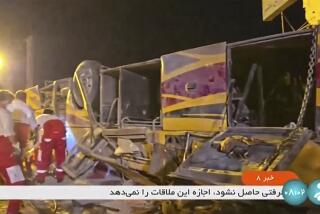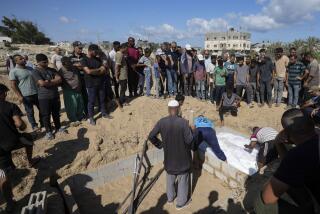Shiites bury their dead; toll growing
- Share via
BAGHDAD — Marching under blood-spattered banners, mourners Wednesday carried coffins through streets still littered with pieces of flesh and debris, as the death toll from three consecutive days of attacks on Shiite Muslim pilgrims climbed to 188.
At least 30 people were killed Wednesday in attacks on some of the more than 1 million pilgrims streaming to the holy city of Karbala for weekend rites commemorating the death of Imam Hussein, grandson of the prophet Muhammad and one of Shiite Islam’s holiest figures.
Overwhelmed health officials said a lack of blood, medicine and ambulances to respond to the carnage contributed to the escalating toll.
The persistent attacks on Shiite Muslims came despite a major U.S. and Iraqi crackdown in Baghdad, which officials believe has contributed to a drop in nightly execution-style killings blamed mostly on Shiite militiamen.
Police in Baghdad said they found 10 unidentified bodies Wednesday. Before the security plan was launched Feb. 13, the number often exceeded 30 a day.
The deployment of thousands of extra troops in Baghdad, however, has not deterred the bombings, drive-by shootings and other attacks blamed on Sunni Arab insurgents.
In Balad Ruz, a religiously mixed town northeast of the capital, a suicide bomber walked into a cafe frequented by members of the ethnic Kurdish minority and blew himself up before dusk Wednesday, police said. At least 26 people were killed and 30 injured in the blast.
Three U.S. soldiers were killed and another was injured when a bomb exploded during efforts to clear explosives from a road northwest of the capital, the military said.
The deaths lifted the number of U.S. personnel killed in the war to 3,188, according to the website icasualties.org, which tracks casualties in Iraq and Afghanistan.
In Baghdad, a car bomb exploded at a checkpoint set up to protect pilgrims along a busy southern highway, killing 22 people, 12 of them police officers, a U.S. military statement said. Another bomb and scattered shootings directed at pilgrims killed eight people, police said.
In Hillah, where two suicide bombers killed at least 117 people and injured 170 Tuesday, a procession of mourners carried 23 coffins through the streets. Some waved banners stained with the blood of the victims, chanting, “This is the blood of Hussein’s martyrs.”
Among the victims were a four-member team providing medical assistance to the pilgrims along the route, health workers said. A doctor working at a nearby surgery also died in the blasts.
But the victim in the broader war, those workers say, is Iraq’s health system, which once was an object of regional envy. Hundreds of doctors have been hunted down and killed. Thousands of others have fled. Corruption and mismanagement have drained hospitals of desperately needed medicine and equipment.
Health workers were reduced to pleading with survivors to donate blood, said Mohammed Radhi, a hospital employee.
Pain killers and antiseptic were in short supply. “People were bringing drugs from private pharmacies to the patients here,” said a nurse who gave her name only as Umm Hussein.
Many patients spent the night on mats and gurneys in the hallway, she said.
In Karbala, 50 miles south of Baghdad, authorities said they had deployed 10,000 policemen to protect pilgrims, subjecting them to multiple searches on the way to the two major shrines that will be the focus of Saturday’s religious rites.
Army Gen. David H. Petraeus, the top U.S. commander in Iraq, and U.S. Ambassador Zalmay Khalilzad expressed outrage at the “heinous and brutal” attacks and promised to help the government track down those responsible.
U.S. and Iraqi officials blame the attacks on Sunni Arab insurgents bent on reigniting sectarian warfare and derailing the latest U.S.-led attempt to secure the country.
Iraq’s government has invited international leaders to a conference Saturday to enlist the support of neighboring countries to quell the violence. Iran confirmed Wednesday that it would attend the meeting, which will provide a rare opportunity for a representative from Tehran to sit down with Khalilzad at the negotiating table.
In Washington, State Department spokesman Sean McCormack said he would not rule out a meeting between U.S. diplomats and Iranian officials on the sidelines of the meeting Saturday.
Khalilzad has said there are no plans for a one-on-one meeting. But he indicated in an interview Sunday with CNN that he was ready to discuss U.S. concerns about weapons used against its troops in Iraq that it believes are coming from Iran.
The attacks on Shiite pilgrims have increased the pressure on Prime Minister Nouri Maliki’s government, which insisted that Shiite militiamen who protected them in the past keep off the streets to avoid confrontations with U.S. forces during the crackdown.
In a sign of discontent within Maliki’s alliance, a Shiite Islamist party said Wednesday that it was pulling out of the coalition that has dominated parliament since elections in 2005, accusing it of becoming a tool of sectarian interests.
Al Fadila al Islamiya party, which controls 15 of parliament’s 275 seats, is the third-largest voting bloc within the United Iraqi Alliance. Its departure could weaken the Shiite coalition that put Maliki in power.
The party called for dismantling political blocs based on sects and ethnicity, replacing them with groupings “based on national interests whose first priorities are Iraq and Iraqis.”
The move could position Fadila to join a new coalition planned by former interim Prime Minister Iyad Allawi’s secular bloc, the main Sunni slate and others, as a counterweight to the Shiite alliance.
Political jockeying has increased in the run-up to Maliki’s promised Cabinet reshuffle. Fadila, which is influential in the oil-rich city of Basra, decided not to participate in Maliki’s current Cabinet when he refused to give it the Oil Ministry.
Maliki has said he wants to replace underperforming ministers with “technocrats.” In his sights is believed to be the Health Ministry, controlled by Sadr’s movement, which is accused of using the country’s hospitals as a source of patronage and refusing treatment to Sunni Arabs.
Falah Hassan, a member of Sadr’s parliamentary bloc, said his movement would be willing to accept changes in all six ministries under its control but only if the replacements were selected from among its candidates.
“This is a national unity government,” he said. It would be “unfair” to ask any bloc to give up part of its share, he said.
*
Times staff writer Raheem Salman in Baghdad and special correspondents in Baghdad, Hillah and Najaf contributed to this report.
More to Read
Sign up for Essential California
The most important California stories and recommendations in your inbox every morning.
You may occasionally receive promotional content from the Los Angeles Times.













